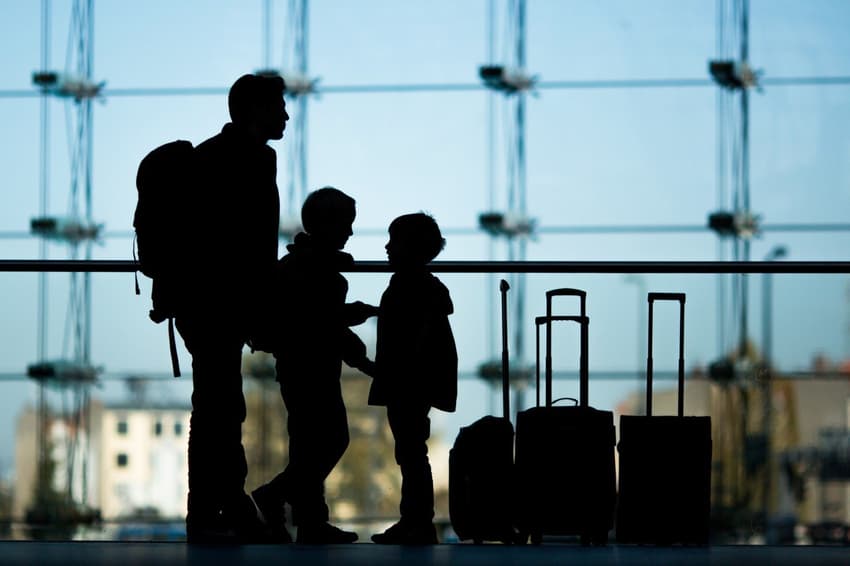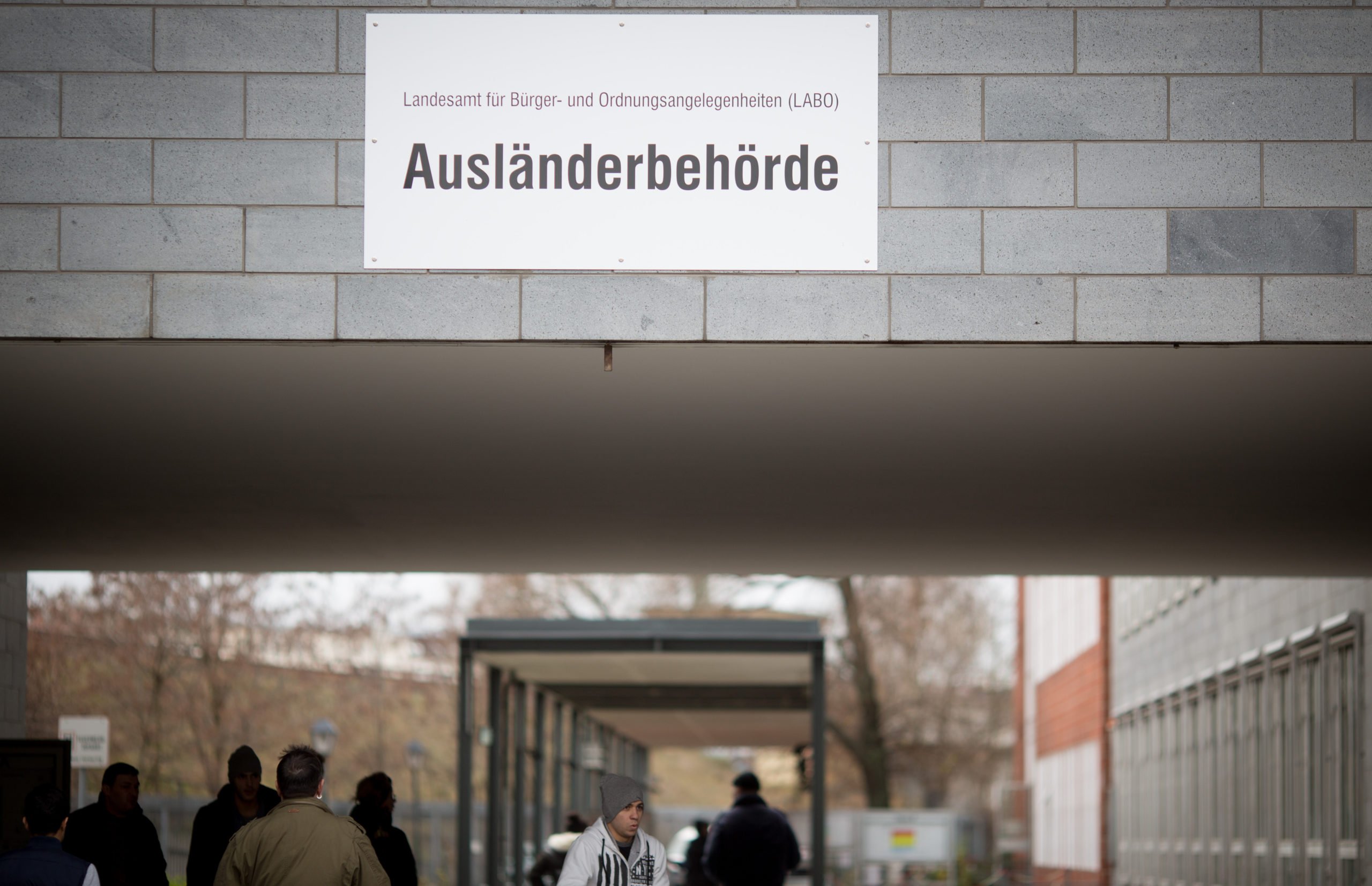'Unfair': Why is Germany only easing family reunification for future skilled workers?

Germany's new skilled worker law will give future generations of migrants the chance to bring their parents over to join them - but foreigners already here are frustrated that the new rules won't apply to them.
When The Local surveyed its readers on the details of the new skilled worker immigration law, the responses were largely positive, with foreigners describing it as "a step in the right direction".
But one major issue stood out in the government's plans: the double standards on rules for family reunification.
Under the new law, skilled workers who arrive in Germany on or after March 1st 2024 will be given special privileges when it comes to getting reunited with their loved ones.
Notably, people will in future be able to bring their parents over to Germany to join them, rather than just their spouses and dependent children.
But unlike the new generation of immigrants, people who are already in the country will still face restrictive rules when it comes to bringing elderly relatives into Germany.
Speaking on The Local's Germany in Focus podcast, immigration lawyer Sven Hasse explained: "At the moment, it's almost impossible to bring your parents to Germany, even if you are German."
READ ALSO: How foreigners will be able to bring their families to Germany under new skilled worker law
In fact, German law states that parents are only allowed to join their children in Germany "in exceptional hardship cases", meaning that a standard situation when one parent has passed away and the other wants to be close to their family is generally not a valid case, Hasse explained.
"In future, the government intends to allow family reunion for parents of skilled workers - but only if the skilled worker has received their residence permit after March next year," he said.
According to Hasse, this means that people applying for work permits now who want to bring their parents with them should consider holding off until March next year when the rules will be changed.
"It's a little bit strange because skilled workers aren't going to profit if they are already in the country," he added. "And no family reunification for Germans will be possible in future either."
'Hurt and disappointed'
Angad Oberoi came to Germany from India in 2017 to complete his Masters degree, and since 2018 has been working full time in IT: one of Germany's in-demand 'bottleneck' professions.
He says he would have qualified for an EU Blue Card but instead opted for a work visa and then permanent residence, as he couldn't see what additional advantages a skilled worker permit would bring.
Now en route to getting German citizenship, Angad had high hopes of bringing his parents over to Germany once the new skilled worker law came in.
"This would be a dream come true, since my parents live alone in India, and it's been my heartfelt wish that I could get them here to live as a family," he said. "Having to apply for a visa before every visit is a pain, and it just makes family life miserable."

An elderly man walks alone near the Frauenkirche in Dresden. The death of one parent is a common reason for people wanting to bring a parent to live with them. Photo: picture alliance/dpa | Robert Michael
However, these hopes were swiftly dashed when he realised the new rules would only apply to people who move to Germany from next year.
"The more I read, the more my heart broke," he said. "It seems like Germany couldn't care less about skilled workers who are already in the country. Are we not valued here?"
With rules remaining tough for the current generation of migrants, Angad says he now has no choice but to stay in Germany and feel stressed or move to another country where immigration laws are more just.
The unequal treatment has left skilled workers in Germany feeling "left out, under-valued and hurt", he said.
Angad is far from the only one feeling disillusioned after hearing about the cut-off date in the skilled worker law.
Bhavesh Uppal, a solar industry worker who lives in Berlin, told The Local that he was facing an impossible dilemma of whether to stay in Germany or move back to India to join his bereaved mother. His brother, a data analyst, is also in Germany, as is his wife, a software engineer.
"My dad died in April and my mother is now alone and fully dependent on us," he said. "I am aggrieved, anguished that the new law doesn’t offer any help to our case."
In The Local's reader survey, the issue of unfairness and the double standards for family reunification also came up time and time again.
READ ALSO: 8 things to know about Germany's new skilled worker immigration law
Rahul Singh, who lives in Freiburg am Breisgau, said Germany could be on the verge of losing a number of talented migrants if it continued down the same path.
"In Indian culture, as in some others as well, taking care of parents is a priority," he explained. Having the opportunity to bring them along makes it much easier for many Indians to continue in Germany."
Rahul said he knew many "well-integrated and contributing immigrants" who were considering a move back to support their parents. "This will be a loss for both sides," he said. "For those returning, and for Germany."

Two Blue Cards for foreign skilled workers are on a table at the Federal Office for Migration and Refugees in Bavaria. Photo: picture alliance/dpa | Daniel Karmann
Diego Sorro, who moved to Germany from Mexico and now lives in Wuppertal, expressed his hope that parental reunification would eventually be eased up, while others pointed out that countries like the UK, US and Canada already allow parents to join their children abroad.
Akshoy Upal, 37, who lives in Hamburg, summed up the sentiments of many when he said: "Whatever the law should be, it should be for all immigrants - not for only new ones."
'Promoting cohesion'
When The Local put these complaints to politicians who had worked on the new law, there were hints that this issue could be reopened again in the future - but no clear answer on when that would be.
"In the first phase of implementation, the focus will be on carefully evaluating the law and its effects," said FDP immigration specialist Dr. Ann-Veruschka Jurisch. This would include looking at the impact of higher immigration on housing and administration.
"We will monitor developments closely and endeavour to extend the regulation further in the future in order to offer this opportunity to skilled workers already working in Germany and to retain them as skilled workers in Germany," Jurisch continued. "This measure not only strengthens social cohesion, but also emphasises our openness to international workers."
READ ALSO: Germany or Austria: Where is it easier to get an EU Blue Card?
However, conversions with the Green Party revealed that there had been strong opposition to expanding parental reunification for everyone.
Branding the new law a "compromise", Greens' immigration expert Misbah Khan said her party had been unable to secure concessions on parental reunification for existing migrants.
"Unfortunately, we Greens were not able to ensure that this regulation applies directly to all those affected, but only to people who come to Germany as skilled workers for the first time from March 1st 2024," she told The Local.

People go in and out of the Ausländerbehörde in Berlin. Photo: picture alliance / Kay Nietfeld/dpa | Kay Nietfeld
Khan also agreed that the unequal rules might prompt more and more workers to leave the country.
"In the discussion about staff shortages, it is too often overlooked that many highly qualified people from abroad are already leaving Germany today," she said.
"As soon as their own parents need care or are permanently separated from their grandchildren, many skilled workers are faced with the question of whether other countries offer better opportunities.
"It is therefore an important step for skilled workers to be able to bring their parents and parents-in-law to Germany more easily with the new immigration law."
READ ALSO: 'Traumatising': Foreign residents share stories from German immigration offices
Though the Greens have lost the initial battle, Khan said they still believe the law should be developed further.
"Only with more opportunities and less mistrust can we turn Germany into a country of skilled labour," she said.
For the time being, though, those who work and pay tax in Germany before March next year will continue to face tough decisions.
Ultimately, many will choose between staying in the country without their parents or moving elsewhere to live as a family.
Comments (3)
See Also
When The Local surveyed its readers on the details of the new skilled worker immigration law, the responses were largely positive, with foreigners describing it as "a step in the right direction".
But one major issue stood out in the government's plans: the double standards on rules for family reunification.
Under the new law, skilled workers who arrive in Germany on or after March 1st 2024 will be given special privileges when it comes to getting reunited with their loved ones.
Notably, people will in future be able to bring their parents over to Germany to join them, rather than just their spouses and dependent children.
But unlike the new generation of immigrants, people who are already in the country will still face restrictive rules when it comes to bringing elderly relatives into Germany.
Speaking on The Local's Germany in Focus podcast, immigration lawyer Sven Hasse explained: "At the moment, it's almost impossible to bring your parents to Germany, even if you are German."
READ ALSO: How foreigners will be able to bring their families to Germany under new skilled worker law
In fact, German law states that parents are only allowed to join their children in Germany "in exceptional hardship cases", meaning that a standard situation when one parent has passed away and the other wants to be close to their family is generally not a valid case, Hasse explained.
"In future, the government intends to allow family reunion for parents of skilled workers - but only if the skilled worker has received their residence permit after March next year," he said.
According to Hasse, this means that people applying for work permits now who want to bring their parents with them should consider holding off until March next year when the rules will be changed.
"It's a little bit strange because skilled workers aren't going to profit if they are already in the country," he added. "And no family reunification for Germans will be possible in future either."
'Hurt and disappointed'
Angad Oberoi came to Germany from India in 2017 to complete his Masters degree, and since 2018 has been working full time in IT: one of Germany's in-demand 'bottleneck' professions.
He says he would have qualified for an EU Blue Card but instead opted for a work visa and then permanent residence, as he couldn't see what additional advantages a skilled worker permit would bring.
Now en route to getting German citizenship, Angad had high hopes of bringing his parents over to Germany once the new skilled worker law came in.
"This would be a dream come true, since my parents live alone in India, and it's been my heartfelt wish that I could get them here to live as a family," he said. "Having to apply for a visa before every visit is a pain, and it just makes family life miserable."

However, these hopes were swiftly dashed when he realised the new rules would only apply to people who move to Germany from next year.
"The more I read, the more my heart broke," he said. "It seems like Germany couldn't care less about skilled workers who are already in the country. Are we not valued here?"
With rules remaining tough for the current generation of migrants, Angad says he now has no choice but to stay in Germany and feel stressed or move to another country where immigration laws are more just.
The unequal treatment has left skilled workers in Germany feeling "left out, under-valued and hurt", he said.
Angad is far from the only one feeling disillusioned after hearing about the cut-off date in the skilled worker law.
Bhavesh Uppal, a solar industry worker who lives in Berlin, told The Local that he was facing an impossible dilemma of whether to stay in Germany or move back to India to join his bereaved mother. His brother, a data analyst, is also in Germany, as is his wife, a software engineer.
"My dad died in April and my mother is now alone and fully dependent on us," he said. "I am aggrieved, anguished that the new law doesn’t offer any help to our case."
In The Local's reader survey, the issue of unfairness and the double standards for family reunification also came up time and time again.
READ ALSO: 8 things to know about Germany's new skilled worker immigration law
Rahul Singh, who lives in Freiburg am Breisgau, said Germany could be on the verge of losing a number of talented migrants if it continued down the same path.
"In Indian culture, as in some others as well, taking care of parents is a priority," he explained. Having the opportunity to bring them along makes it much easier for many Indians to continue in Germany."
Rahul said he knew many "well-integrated and contributing immigrants" who were considering a move back to support their parents. "This will be a loss for both sides," he said. "For those returning, and for Germany."

Diego Sorro, who moved to Germany from Mexico and now lives in Wuppertal, expressed his hope that parental reunification would eventually be eased up, while others pointed out that countries like the UK, US and Canada already allow parents to join their children abroad.
Akshoy Upal, 37, who lives in Hamburg, summed up the sentiments of many when he said: "Whatever the law should be, it should be for all immigrants - not for only new ones."
'Promoting cohesion'
When The Local put these complaints to politicians who had worked on the new law, there were hints that this issue could be reopened again in the future - but no clear answer on when that would be.
"In the first phase of implementation, the focus will be on carefully evaluating the law and its effects," said FDP immigration specialist Dr. Ann-Veruschka Jurisch. This would include looking at the impact of higher immigration on housing and administration.
"We will monitor developments closely and endeavour to extend the regulation further in the future in order to offer this opportunity to skilled workers already working in Germany and to retain them as skilled workers in Germany," Jurisch continued. "This measure not only strengthens social cohesion, but also emphasises our openness to international workers."
READ ALSO: Germany or Austria: Where is it easier to get an EU Blue Card?
However, conversions with the Green Party revealed that there had been strong opposition to expanding parental reunification for everyone.
Branding the new law a "compromise", Greens' immigration expert Misbah Khan said her party had been unable to secure concessions on parental reunification for existing migrants.
"Unfortunately, we Greens were not able to ensure that this regulation applies directly to all those affected, but only to people who come to Germany as skilled workers for the first time from March 1st 2024," she told The Local.

Khan also agreed that the unequal rules might prompt more and more workers to leave the country.
"In the discussion about staff shortages, it is too often overlooked that many highly qualified people from abroad are already leaving Germany today," she said.
"As soon as their own parents need care or are permanently separated from their grandchildren, many skilled workers are faced with the question of whether other countries offer better opportunities.
"It is therefore an important step for skilled workers to be able to bring their parents and parents-in-law to Germany more easily with the new immigration law."
READ ALSO: 'Traumatising': Foreign residents share stories from German immigration offices
Though the Greens have lost the initial battle, Khan said they still believe the law should be developed further.
"Only with more opportunities and less mistrust can we turn Germany into a country of skilled labour," she said.
For the time being, though, those who work and pay tax in Germany before March next year will continue to face tough decisions.
Ultimately, many will choose between staying in the country without their parents or moving elsewhere to live as a family.
Join the conversation in our comments section below. Share your own views and experience and if you have a question or suggestion for our journalists then email us at [email protected].
Please keep comments civil, constructive and on topic – and make sure to read our terms of use before getting involved.
Please log in here to leave a comment.